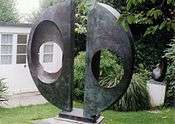Two Forms (Divided Circle)
|
Two Forms (Divided Circle) in Israel. | |
| Year | 1969 |
|---|---|
| Dimensions | 237 cm × 234 cm × 54.3 cm (93 in × 92 in × 21.4 in)[1] |
| Accession | BH 477[2] |
Two Forms (Divided Circle) (BH 477) is a bronze sculpture by Barbara Hepworth, designed in 1969. Six numbered copies were cast, plus one (0/6) retained by the sculptor.[2] The sculpture's dimensions are 2,370 centimetres (930 in) by 2,340 centimetres (920 in) by 54 centimetres (21 in).[1]
The front of the base has "Barbara Hepworth 1969" inscribed on it followed by the number of the sculpture, as well as "Morris | Singer | FOUNDERS | LONDON", both inscribed by casting.[1]
The sculpture is considered to be one of Britain's most recognisable works.[3]
The sculpture is late work by Hepworth, created only 6 years before her death in a fire at her studio in St Ives in 1975. It includes two vertical bronze semi-circles forming a broken circle approximately 2 metres (6 ft 7 in) across, each pieced pierced by one large hole. Both elements are welded to a bronze base. All three elements are hollow, and were cast in London by Morris Singer.
Hepworth designed the work after being diagnosed with cancer in 1966. She wanted the viewer's body to be engaged with her work, saying: "You can climb through the Divided Circle – you don't need to do it physically to experience it."[3]
Hepworth also made a series of nine maquettes about 14.5 inches (370 mm) tall, Maquette for Divided Circle, cast in polished bronze.
Casts
| Image | Number | Location | Owner | Notes |
|---|---|---|---|---|
 |
0/6[1] | Barbara Hepworth Museum, St Ives[2] | Tate Gallery[1] | Bequested by the executors of Hepworth's estate to Tate in 1980.[4] |
 |
4/6[4] | Junction of Moor Lane and Deansgate.[5] In front of the Senate House. | University of Bolton (on loan from Bolton Museum).[2][4] | Purchased in 1970; relocated in 1982.[5] |
_by_Barbara_Hepworth_in_Dulwich_(6112761980).jpg) |
5/6[4] | Dulwich Park | Southwark Council[6] | The sculpture was purchased by Greater London Council[4] in 1970; its ownership was subsequently transferred to Southwark Council. The sculpture was stolen overnight on the 19–20th December 2011. The theft was thought to be due to metal thieves, and it was feared that the sculpture was sold for scrap. The sculpture was insured for £500,000, and Southwark Council offered a reward of £1,000 for information leading to the arrest and conviction of the thieves;[7][6][8] the reward was subsequently increased to £5,000 by Barbara Hepworth's granddaughter.[9] The scrap value of the sculpture was estimated to be £750.[3] The sculpture was replaced by Conrad Shawcross's Three Perpetual Chords.[10] |
| |
Fellows’ Garden, Clare College, Cambridge. | Clare College, Cambridge (on loan from the Hepworth Estate)[2] | ||
| Mary and Leigh Block Museum of Art, Northwestern University, Evanston, Illinois.[2] | ||||
| |
Lola Beer Ebner Sculpture Garden in Tel Aviv | |||
| Private collection in the USA |
References
- 1 2 3 4 5 "Two Forms (Divided Circle)]". Tate Gallery. Retrieved 21 November 2014.
- 1 2 3 4 5 6 "Barbara Hepworth: sculptures – Two Forms (Divided Circle)". barbarahepworth.org.uk. Retrieved 21 November 2014.
- 1 2 3 "Barbara Hepworth: £500k 'Two Forms' sculpture stolen by metal thieves". The Telegraph. 20 December 2011. Retrieved 21 November 2014.
- 1 2 3 4 5 Stephens, Chris (March 1998). "Tate Catalogue entry". Tate Gallery. Retrieved 21 November 2014.
- 1 2 Wyke, Terry. Public Sculpture Of Greater Manchester. p. 209. ISBN 978-0853235675.
- 1 2 "Barbara Hepworth sculpture stolen from London park". The Guardian. 20 December 2011. Retrieved 21 November 2014.
- ↑ "Very grand theft: Barbara Hepworth's park sculpture is stolen for scrap metal". The Independent. 21 December 2011. Retrieved 21 November 2014.
- ↑ "Barbara Hepworth sculpture stolen from Dulwich Park". BBC News. 20 December 2011. Retrieved 21 November 2014.
- ↑ "Reward for Hepworth art stolen from Dulwich Park increased". BBC News. 23 December 2011. Retrieved 21 November 2014.
- ↑ "Barbara Hepworth sculpture stolen from Dulwich Park to be replaced with 'anti-theft' works by Conrad Shawcross". The Independent. 20 October 2013. Retrieved 21 November 2014.
External links
-
 Media related to Two Forms (Divided Circle) at Wikimedia Commons
Media related to Two Forms (Divided Circle) at Wikimedia Commons
